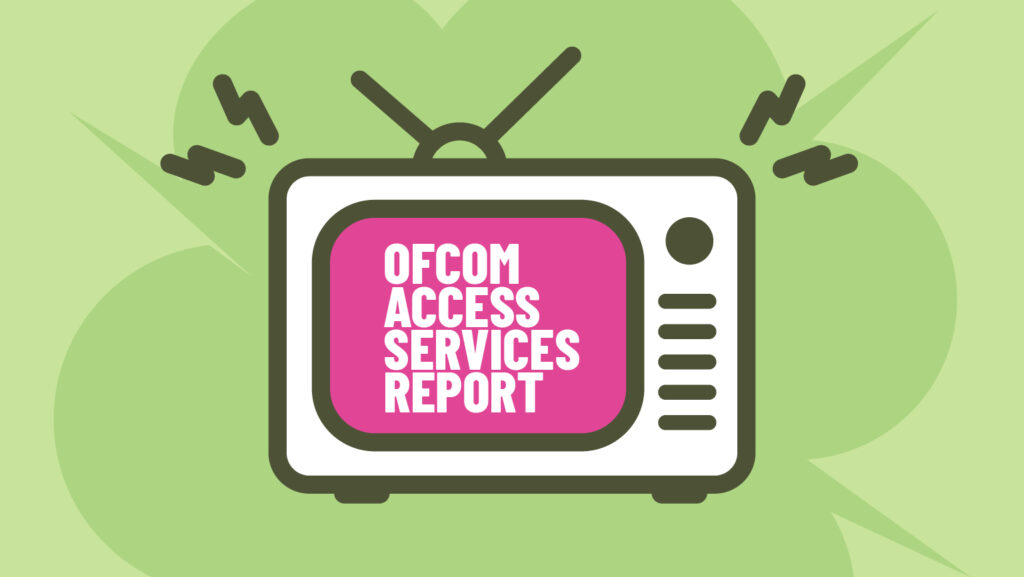
- Major on-demand services including All4 and ITV Hub reported 0% subtitle provision on some platforms.
- Overall provision of subtitles on on-demand services has marginally increased from 66.1% in 2021 to 71.7% in 2022.
- Provision of signed content remains low, at 2.3%.
Today Ofcom published the Television and On-demand Access Services Report for 2022 which sets out the subtitling, signing and audio description coverage that channels and on-demand services achieved last year.
Without subtitles and signed content, TV is inaccessible for deaf people, as well as people with hearing loss. RNID’s Subtitle It Campaign has been calling for quotas for on-demand services to ensure that these vital services are provided for people who are deaf and people with hearing loss.
What does the report say?
Having reviewed which on-demand services have met the Draft Media Bill’s proposed 80% subtitle quota and 5% signing quota, progress appears somewhat mixed. While Ofcom reports that the overall provision of subtitling has increased from 66.1% in 2021 to 71.7% in 2022 of total programming hours, the majority of services do not consistently provide subtitles across different platforms. Additionally, the total percentage of programme hours with signing remains very low, rising marginally from 2% in 2021 to 2.3% in 2022.
The Draft Media Bill published earlier this year proposed that ‘Tier 1’ services, which we would expect to be the major on-demand services, should be achieving 80% subtitling, 10% audio description and 5% signing on every platform they are delivered through.
RNID are disappointed to see that many on-demand service providers are still not achieving 80% subtitle coverage across all platforms.
The delivery of subtitles on some of the major channels is inconsistent across different platforms. For example, Channel 4’s on-demand service All4 achieved 0% subtitle provision on Sky Go, Now TV and Google Chromecast, while achieving 97.08% on its own website. Similarly, ITV achieved 90.09% subtitle provision through its own website, but 0% on Sky On-demand and YouView platforms. This means that people who are deaf and people with hearing loss have less choice about where they can access the service.
There are still some poor performing platforms where subtitle provision is very low. For example, YouView platforms achieved 99.22% on Britbox services but only 59.15% on STV player.
And while new platform Paramount Plus successfully achieved 100% subtitle provision across all the platforms it is available through, it failed to deliver any signed content.
It is worth noting that the report is only indicative as not all on-demand services report their access service provision to Ofcom as they have no statutory reporting duty, however many of the major services do report including: ITV Hub (now ITVX), Disney Plus and currently All4.
What we think
We are calling on on-demand service providers to ensure that subtitles are available on their services regardless of where people are watching. They should also do more to increase the provision of signed content on their platforms to improve access for British Sign Language (BSL) users.
Robert Geaney, Campaigns and External Affairs Lead at RNID, said;
“We are disappointed to see in the Ofcom Television and On-demand Access Services Report that many on-demand services are still not achieving the Draft Media Bill’s proposed 80% subtitle quota across different platforms and that the provision of signed content remains incredibly low at just 2.3%. Without subtitles and signed content, TV is inaccessible for deaf people, as well as people with hearing loss. RNID have been campaigning for almost a decade so that there are quotas for on-demand services to ensure that these vital services are provided for people who are deaf and people with hearing loss.
“This report shows the need for the Government to take action quickly to ensure that on-demand services are made accessible and we hope that the Government will introduce the Media Bill and relevant secondary legislation as soon as possible to make television and on-demand services accessible for everyone.”
